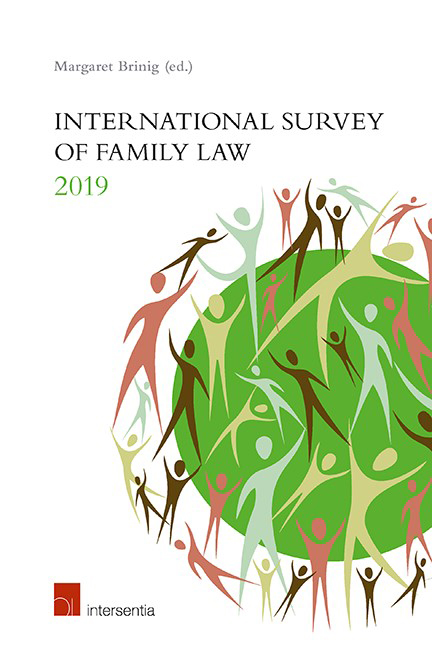Book contents
- Frontmatter
- Preface
- Contents
- List of Contributors
- Albania: Are Albanian Legal Rules on Divorce Adequate for High-Conflict Divorces?
- Australia: Reform and Complexity: A Difficult Balance
- Brazil: The Social Food Bank and the State's Duty to the Child in the Face of the Non-Fulfillment of Child Support Executions
- Canada: Habitual Residence of Abducted Children and Divorce Act Reform
- China: On Protection of the Child's Right to Care under the Minor Guardianship System in China
- England and Wales: Familial Relationships: Entrances and Exits
- The Faroe Islands: A New Family Law is Born
- France: A Chronicle of French Family Law
- Hong Kong: Slow Progress Towards Family Law Reform?
- Ireland: ‘Best Interests’ as a Limited Constitutional Imperative
- Italy: The Divorce Allowance in Italian Law: The Role of Jurisprudence in the Formation of the Legal Rule in the Family Sphere
- Korea: AID and Surrogacy in Korean Law
- Namibia: Towards a New Juvenile Justice System in Namibia
- New Caledonia: Legal Pluralism and Diversity of Interpretation of Fundamental Rights (Common Law, Customary Law, Reservation Related to Indigenous Rights): The Example of New Caledonia
- New Zealand: Reform is in the Air
- Papua New Guinea: State and Customary Laws and the Underlying Law of Papua New Guinea: A Family Law Conundrum
- Portugal: What's Mine is Mine and Won't be Yours: The Newly Introduced Possibility of Opting Out of the Mandatory Succession Effects of Marriage in Portugal
- Serbia: Transgender Issues before the Constitutional Court of Serbia
- The Seychelles: The Seychellois Family Tribunal and its Implementation of the Family Violence (Protection of Victims) Act 2000
- UN Committee on the Rights of the Child: Reflections on Family Law Issues in the Jurisprudence of the CRC Committee: The Convention on the Rights of the Child @ 30
- United States of America: Same-Sex and Different-Sex Relationships: Is it Time for Convergence?
- Index
Preface
Published online by Cambridge University Press: 09 November 2019
- Frontmatter
- Preface
- Contents
- List of Contributors
- Albania: Are Albanian Legal Rules on Divorce Adequate for High-Conflict Divorces?
- Australia: Reform and Complexity: A Difficult Balance
- Brazil: The Social Food Bank and the State's Duty to the Child in the Face of the Non-Fulfillment of Child Support Executions
- Canada: Habitual Residence of Abducted Children and Divorce Act Reform
- China: On Protection of the Child's Right to Care under the Minor Guardianship System in China
- England and Wales: Familial Relationships: Entrances and Exits
- The Faroe Islands: A New Family Law is Born
- France: A Chronicle of French Family Law
- Hong Kong: Slow Progress Towards Family Law Reform?
- Ireland: ‘Best Interests’ as a Limited Constitutional Imperative
- Italy: The Divorce Allowance in Italian Law: The Role of Jurisprudence in the Formation of the Legal Rule in the Family Sphere
- Korea: AID and Surrogacy in Korean Law
- Namibia: Towards a New Juvenile Justice System in Namibia
- New Caledonia: Legal Pluralism and Diversity of Interpretation of Fundamental Rights (Common Law, Customary Law, Reservation Related to Indigenous Rights): The Example of New Caledonia
- New Zealand: Reform is in the Air
- Papua New Guinea: State and Customary Laws and the Underlying Law of Papua New Guinea: A Family Law Conundrum
- Portugal: What's Mine is Mine and Won't be Yours: The Newly Introduced Possibility of Opting Out of the Mandatory Succession Effects of Marriage in Portugal
- Serbia: Transgender Issues before the Constitutional Court of Serbia
- The Seychelles: The Seychellois Family Tribunal and its Implementation of the Family Violence (Protection of Victims) Act 2000
- UN Committee on the Rights of the Child: Reflections on Family Law Issues in the Jurisprudence of the CRC Committee: The Convention on the Rights of the Child @ 30
- United States of America: Same-Sex and Different-Sex Relationships: Is it Time for Convergence?
- Index
Summary
The 2019 International Survey of Family Law again contains contributions from all inhabited continents, from both junior and established scholars, from industrialized and third world countries. Despite the tendencies toward pluralism, several themes seem to emerge, though not all of the 21 contributions involve one of these themes.
The first theme is the issue of pluralism itself, whether because a former colonial power is now ceding authority to a country with its own traditions or whether the state has both civil and customary law involving families. These issues characterize the contributions from the Faroe Islands, New Caledonia, Papua New Guinea and New Zealand.
A second theme involves various nations’ attempts to deal with domestic violence, sometimes in cases involving shared parenting. Various contrasting solutions on these matters are presented by authors of the contributions from Australia, Canada, New Zealand and the Seychelles.
The contributions on Ireland and Hong Kong focus on the third strand, which concerns the problems of more traditional societies (at least in family law) now dealing with contemporary family law issues.
Finally, some contributions discuss the issues relating to assisted reproductive technology and the related issues of LGBT identity. This concern characterizes the contributions from Korea, Serbia and the United States.
My profound thanks go to Dominique Goubau and Christine Bidaud-Garon for their invaluable work in translating (and sometimes helping create) French abstracts for each chapter. The abstracts make the survey more accessible to Francophone countries around the world. Translating becomes still more of an art when the legal language is taken out of context, as it frequently is in these summations.
For those desiring to learn more about the Society, its goals and history, or how to join the Society, the place to look is the ISFL website, www.isflhome.org.
- Type
- Chapter
- Information
- International Survey of Family Law 2019 , pp. v - viPublisher: IntersentiaPrint publication year: 2019

